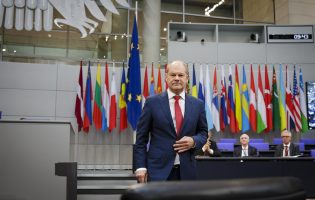Germany and the Spider-Man Doctrine
Patrick Keller
Konrad Adenauer Stiftung
A former AICGS/DAAD Fellow, Patrick Keller is the Coordinator of Foreign and Security policy at the Konrad Adenauer Stiftung
Call it the Spider-Man Doctrine: With great power comes great responsibility. Enunciated not by Stan Lee but by Germany’s President Joachim Gauck in a speech at last week’s Munich Security Conference, this sentiment made front page news all over Europe. Why? Because Mr. Gauck urged Germans to fundamentally rethink their attitude toward international affairs in general and international security in particular.
Mr. Gauck’s argument is as simple as it is compelling: Germany is the most populous state in Europe, by far the continent’s most stable and prosperous economy, enjoys centrality in geography and, by dint of all the above, a dominant voice in the European Union. As a trading state, its freedom, wealth, and influence result from the existing liberal international order. However, for six decades, Germany contributed relatively little to upholding that order, especially in terms of military force.
With ongoing changes in the international power structure and with the new security challenges of globalization—international and cyber-terrorism, unstable and failing states—free-riding on the back of U.S. power and performance should no longer be an option. “Germany and its European partners must themselves assume greater responsibility for their security,” said Mr.Gauck, admonishing those of his countrymen “who use Germany’s guilt for its past as a shield for laziness or a desire to disengage from the world.”
While perhaps a surprise to many non-Germans, Mr. Gauck’s speech actually reflects a broad consensus among Germany’s strategic community. “More international responsibility” is the leitmotif of numerous Berlin think-tank pieces published in the last year. The first sentence of the foreign-policy section in last fall’s coalition treaty between Angela Merkel’s Christian Democrats and the Social Democratic Party reads: “Germany faces up to its international responsibility.”
Still, all these promising phrases are just that. Mr. Gauck’s office is largely ceremonial, Germany’s strategic community is notoriously inconsequential, and paper—especially when containing coalition promises—cannot blush.
For Mr. Gauck’s vision of a readjusted German security policy to become a reality, two major problems need to be solved: Germany’s lack of military capabilities, and the lack of political will to use them.
The fact is, Berlin has not made the defense budget a national priority for decades. German defense accounts for just over 1.2% of GDP today, down from roughly 2% in 1991. In comparison, the budget for the German ministry of labor and welfare is more than four times the size of that of the ministry of defense. It’s no surprise then that the size of the German military continues to shrink, with fewer than 10,000 combat-ready deployable forces today and less than 15% of the budget allocated for developing military technology and procuring new weapons systems.
European and NATO partners continue to sound their hope that by “pooling and sharing” defense efforts and procurement programs, they can overcome national deficits in military capabilities. Progress on this front has been small, where there has been progress at all. If Berlin is truly serious about stepping up its game internationally when it comes to hard security matters, it will have to spend more to do so.
A cynic might suggest that one reason German politicians have not increased defense spending, despite obvious shortfalls in capability over the years, is that they thus have a built-in excuse not to participate more fully in difficult security missions. This brings us to the second fundamental problem with the German pledge to be a more serious international security actor: political will.
Although Berlin has continuously deployed troops abroad since the mid-1990s, it has done so in a manner that is either too little, too late or too risk-averse. If anything—as illustrated by German reluctance to involve itself in the Libyan operation and, more recently, the Central African Republic— popular opinion against foreign adventures has increased. A recent poll found that more than 60% of the German public oppose increased military missions abroad.
No doubt Paris welcomes the new coalition government’s recent promise to send German troops to Mali in support of the French effort there. But those soldiers will not be fighting alongside their French counterparts; instead, they will limit themselves to rear-area support and training Malian soldiers.
Even so, President Gauck’s speech was met with harsh criticism by the parliamentary opposition of the Green Party and Leftists. They fear a “militarization” of German foreign policy and argue that the West’s recent military engagements in Afghanistan, Libya, and Iraq failed to produce the desired political results. This view plays to anti-militaristic reflexes held by many Germans today, giving pause to the more ambitious agenda of security-policy elites.
What Germany needs is a broader public debate about the country’s role in the world. But that debate has to be led by actual decision-makers—starting with Chancellor Merkel and her ministers. More importantly, such a debate needs to produce tangible results. Germany should contribute earlier and more decisively to stabilizing the European periphery—in North Africa, the Middle East and Eastern Europe.
Waiting for allies to call for German engagement is no longer sufficient. No one said it would be easy, but Germany must now step up to the responsibility that comes with its power.
A former AGI/DAAD Fellow, Patrick Keller is now the Coordinator of Foreign and Security policy at the Konrad Adenauer Stiftung, and Gary Schmitt is the Director of the Marylyn Ware Center for Security Studies at the American Enterprise Institute. This essay appeared in the Wall Street Journal on February 6, 2014 and is reprinted with the authors’ permission.








